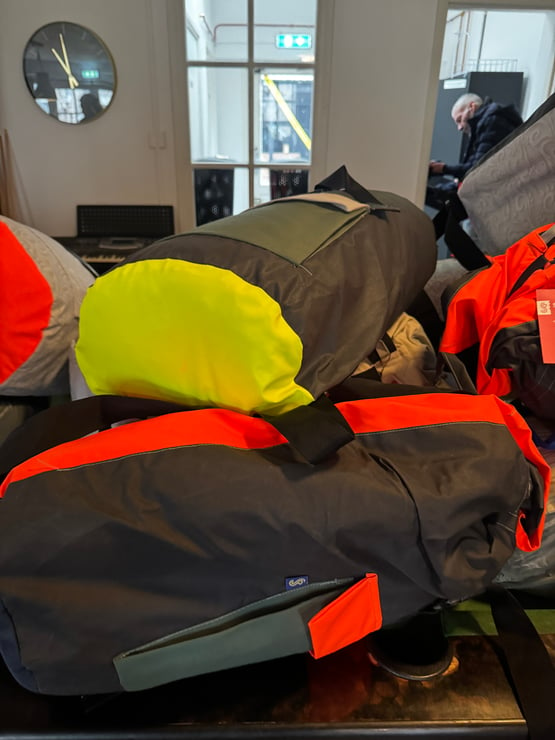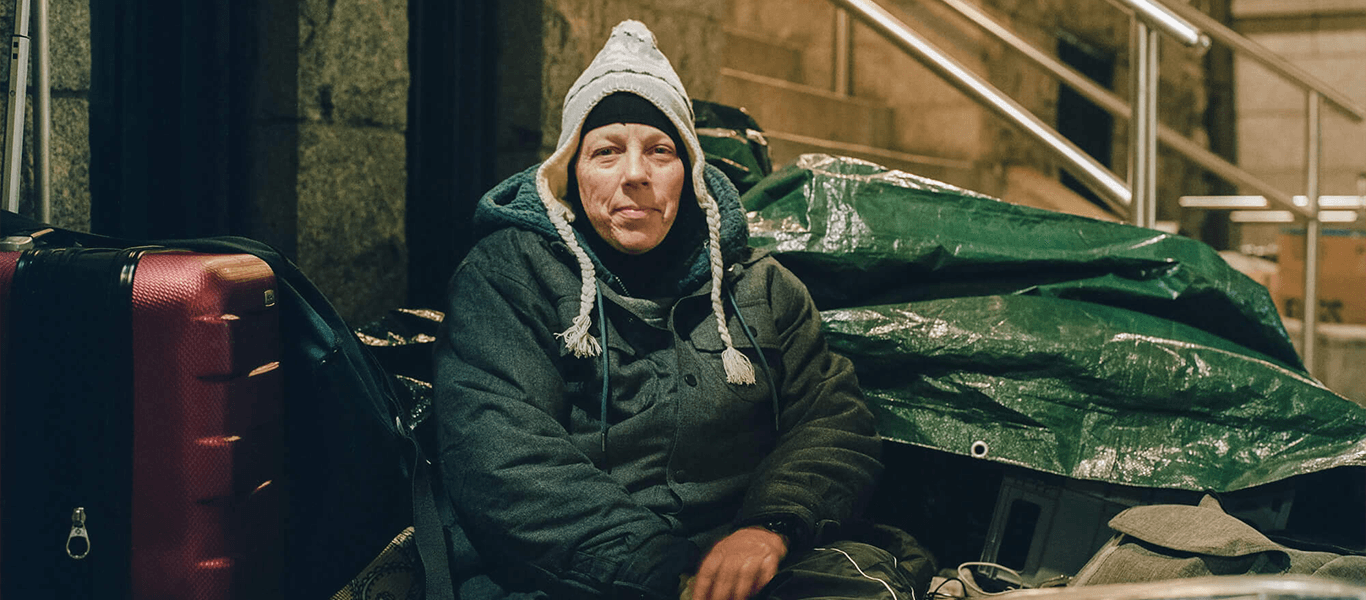The Amsterdam Homeless Union receives several hundred pieces of mail every day. All these letters, cards and packages are addressed to homeless people who have applied for a letter address there. "Only those who have an address exist in this country," says client support worker Theo van Ghesel Grothe. Read his story about the union, the Coffee Bike, Sheltersuits and "envelope fear" below.
Those who regain a letter address after a long time quickly appear on the radar of businesses and agencies. The reminders, reminders, bills and assessments pile up in a short time. "That's why I sit down with my client after applying for a letter address. From which agencies is he expecting annoying mail? "Then Theo makes a schedule for arranging and dealing with all outstanding matters. "In practice, this reduces anxiety and gives someone perspective again." According to Theo, official letters are often needlessly complicated because of all the technical jargon. "Those texts are difficult to understand not only for the low-literate, and my clients are then left with their hands in their pockets. By offering a helping hand, I reduce someone's 'letter anxiety'."
The Homeless Union
The Homeless Union where Theo works is a small organization consisting mainly of experts by experience and (ex)-homeless people. The organization stands up for the rights of the homeless and people from other marginalized groups. In addition to support in obtaining a letter address, the organization advises the (municipal) government on the issue of homelessness. How? By being present in council committees, neighborhood teams, working groups and other consultations.
Furthermore, clients can use a walk-in clinic to ask questions, pick up their mail or have a cup of coffee. Theo also provides individual support to homeless people. In doing so, he can act independently, which is stipulated in his job description. "For example, I go with a client who wants to apply for welfare benefits. Especially when a homeless person has been turned away from the municipality before, while my assessment is that he is entitled to benefits."
Listening well, not judging and being helpful. Very important traits for working with homeless people.
Listening well, not judging and being helpful. These are what Theo considers the most important qualities to do his job well. "Unfortunately, it is impossible to help every homeless person directly. However, I can be there for everyone. When a client leaves with a good feeling after an introductory meeting, the foundation has been laid." Change requires a long breath!
Theo counsels people who often face complex problems in multiple areas of life. They often involve a combination of debt, addictions, mental health issues, low literacy and sometimes trauma. "I listen attentively, am open-minded and each client is given the time they need. When I have the picture complete, I try to be a guide. People often have no idea which organization to turn to for help. I help them along the way."
Homeless people often have jobs
Yet Theo wants to avoid painting the picture of pathetic, helpless homeless people. According to him, most homeless people are resilient people who have gotten into trouble because of common life events, such as job loss, a broken relationship or the death of a loved one. People get down in the dumps, stop paying their bills and are thrown out on the street. "Those who have a small social safety net quickly get into trouble. The first 3 months you can turn to family and friends, but after that you are on your own."
The corona crisis is also having an impact. For example, Theo recently spoke with a client who cleans in hotels. His income is down because there is less work. "People don't know what to do to get additional benefits, for example. Procedures are often too complicated." Another group currently struggling are baggage workers at Schiphol Airport.
A divorced construction worker has helped build hundreds of homes, but no place of his own to receive his children.
Yet another factor affecting homelessness is problems in housing. There are too few social housing units in Amsterdam, and waiting times reach 15 years. "Among others, I accompany a streetcar driver and a cook. These men go straight to the night shelter after work." Theo also tells of a construction worker separated from his wife. "This client has helped build hundreds of homes, but has no home to accommodate his children.
Furthermore, Theo sees the number of homeless youths increasing. This is due to the cost-sharing standard, which applies to adults who share housing. This is because the number of roommates over 21 affects the amount of a person's welfare benefit. In practice, children who turn 21 therefore often leave home. When they cannot find a room, they soon find themselves on the street. "How nice would it be if a welfare recipient could rent out a room to an economically homeless person. One earns an extra penny and the other has a place to get his affairs in order."
Getting in touch with the Coffee Bike
As a client advocate, Theo also does outreach work. He seeks out homeless people in parks and at other popular "hangouts. He answers questions and engages aid organizations directly if the situation calls for it. The other day he got talking to a group of homeless people. When asked if anyone needed anything, he got a witty response. 'I like sushi, but a bami slice will do!' Fortunately, it is not all doom and gloom. On the contrary! Homeless people are often in for a joke.

Theo is not only active for the Homeless Union. Every week he makes a round through Amsterdam on the Koffiets (Coffee Bike). With this electric cargo bike, he cycles past places where homeless people gather. "We offer a cup of coffee and a sandwich. In the summer, we also carried cooling ice creams.
The Koffiets is a project of the Amsterdam Protestant Diaconate. "It is not at all evangelical in nature. I myself do not try to sell the Homeless Union either when I am on the road with the cargo bike. The Koffiets is a project to integrate the homeless into the streets of Amsterdam. A means of getting in touch and giving homeless people a voice."
The Coffee Bike is a means of integrating Amsterdam's homeless into the street scene.
Theo says he likes to strike up a conversation with a homeless person to ask how his day is. "I hope Amsterdammers see that and follow our example. They just belong!" For that reason, the Koffiets' volunteers often take fellow city residents with them. "Preferably I invite someone twice, because we're not going to monkey around," he says. For example, Theo has brought people from his circle of acquaintances. "We also seek contact with people from a completely different area. For example, I would love to cycle my round with a trader from the Zuidas one day."
For Theo, it is important that people abandon their preconceptions about homelessness. Start a conversation, go to work in a soup kitchen, make homelessness negotiable. "For that reason, I think Sheltersuit is such a great initiative. The Sheltersuits and Shelterbags offer comfort and are a great way to connect. I have already had the opportunity to hand out a number of them. Standing up for the homeless? Just do it!"


















